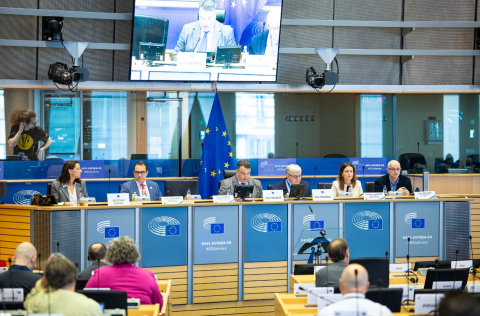European Economic
and Social Committee
EESC urges stronger EU action on rule of law, highlights the announced civil society platform
Just a few days after the nomination of a new European Commissioner for Democracy, Justice, and the Rule of Law, the European Economic and Social Committee (EESC) has issued a strong call for a renewed commitment to the rule of law and fundamental rights within the EU. At its September plenary session, the EESC took stock of the current situation and debated ideas for a stronger EU response, including European Commission President von der Leyen's recent announcement of a long-anticipated civil society platform.
The EESC, which has been advocating the creation of this platform since 2016, sees it as a crucial step towards enhancing civil dialogue and involvement in EU policymaking on the rule of law. A platform of this kind could provide a structured space for civil society organisations to interact with EU institutions and influence decisions on rule of law issues.
Joachim Herrmann, Deputy Head of the Cabinet of Didier Reynders, European Commissioner for Justice, presented findings from the European Commission’s latest rule of law report, highlighting the extension of the mechanism to accession countries and its relevance to the single market, and stressing the need for closer cooperation across sectors.
On the importance of balancing competing priorities within the EU, Jerzy Pomianowski, Executive Director of the European Endowment for Democracy (EED), cautioned that deprioritising democracy support in favour of other agendas, such as migration and security, could have long-term consequences for EU security. He recommended allocating 5% of development aid to democracy programmes and advocated sending stronger signals to repressed civil societies and setting tougher enlargement conditions focused on civic space and democratic reform.
Amid growing concerns about authoritarianism, threats to judicial independence, and shrinking civic space, participants in the EESC debate emphasised the need for immediate and decisive action. Kevin Casas-Zamora, Secretary-General of the International Institute for Democracy and Electoral Assistance (International IDEA), praised the EU rule of law cycle but warned of downward trend in democracy within the EU. He called for stronger civil society support and an expanded rule of law report to address fundamental rights abuses, organised crime, and disinformation.
The EESC reaffirmed the indispensable role of civil society in defending the rule of law and fundamental rights, with strong calls for increased support for civil society initiatives and their integration into policy-making processes. Alexandrina Najmowicz, Secretary-General of the European Civic Forum, echoed this sentiment, urging a review of the rule of law reports’ impact and advocating a more comprehensive approach linking the rule of law with democracy and social cohesion. She also called for clearer recommendations and an early warning system for emerging threats.
The establishment of the civil society platform, coupled with a renewed commitment to the rule of law and fundamental rights, is crucial for ensuring a just and prosperous future for the European Union. The EESC plenary debate served as a powerful reminder of the urgent need to uphold democratic values, with a comprehensive approach that connects rule of law, democracy, and economic development.
